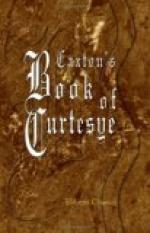[Footnote 1: i. Haue in their clothes. i. lice.]
[Footnote 2: i. Haue not in hand.]
But the subject is not a very pleasant one for discussion, though the occupation alluded to in the Oriel Text must have been one of the pastimes of many people in Early England.
The book itself, Lytill Johan, is by a disciple of Lydgate’s—see l. 366, p. 36-7—and contains, besides, the usual directions how to dress, how to behave in church, at meals, and when serving at table, a wise man’s advice on the books his little Jack should read, the best English poets,—then Gower, Chaucer, Occleve, and Lydgate,—not the Catechism and Latin Grammar. It was very pleasant to come off the directions not to conveye spetell over the table, or burnish one’s bones with one’s teeth, to the burst of enthusiasm with which the writer speaks of our old poets. He evidently believed in them with all his heart; and it would have been a good thing for England if our educators since had followed his example. If the time wasted, almost, in Latin and Greek by so many middle-class boys, had been given to Milton and Shakspere, Chaucer and Langland, with a fit amount of natural science, we should have been a nobler nation now than we are. There is no more promising sign of the times than the increased attention paid to English in education now.
But to return to our author. He gives Chaucer the poet’s highest gift, Imagination, in these words,
what ever to say he toke in
his entente,
his langage was so fayer &
pertynante,
yt semeth vnto
manys heryng
not only the
worde, but veryly the thyng. (l. 343.)
And though the writer has the bad taste to praise Lydgate more than Chaucer, yet we may put this down to his love for his old master, and may rest assured that though the cantankerous Ritson calls the Bury schoolmaster a ‘driveling monk,’ yet the larking schoolboy who robbed orchards, played truant, and generally raised the devil in his early days (Forewords to Babees Book, p. xliv.), retained in later years many of the qualities that draw to a man the boy’s bright heart, the disciple’s fond regret. We too will therefore hope that old Lydgate’s
sowle
be gon
(To) the sterred paleys above
the dappled skye,
Ther to syng Sanctus
insessavntly
Emonge the mvses
nyne celestyall,
Before the hyeste
Iubyter of all. (l. 381-5.)
In old age the present poem was composed (st. 60, p. 42-3); ’a lytill newe Instruccion’ to a lytle childe, to remove him from vice & make him follow virtue. At his riper age our author promises his boy the surplusage of the treatise (st. 74, p. 50-1); and if a copy of it exists, I hope it will soon fall in our way and get into type, for ’the more the merrier’ of these peeps into old boy-life.
On one of the grammatical forms of the Oriel MS., Mr Skeat writes:




